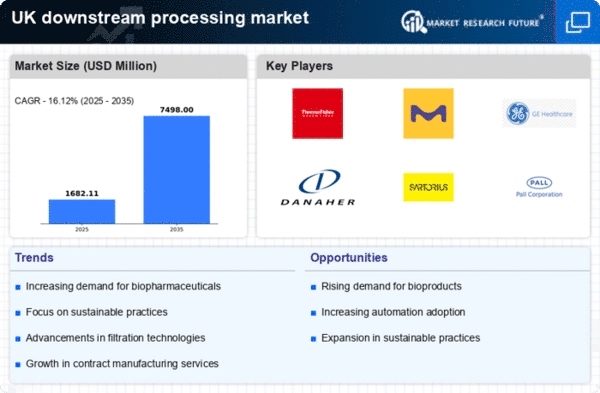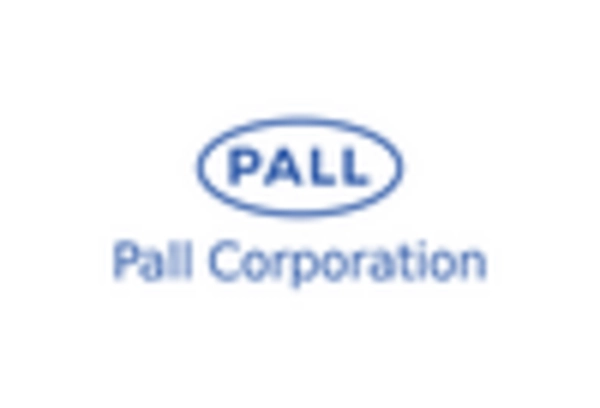Growing Focus on Cost Efficiency
Cost efficiency is becoming a pivotal concern for companies operating in the downstream processing market in the UK. As competition intensifies, businesses are seeking ways to streamline their operations and reduce production costs. This has led to the adoption of innovative technologies that enhance productivity while minimizing waste. The implementation of cost-effective downstream processing solutions is projected to increase market competitiveness. Furthermore, the rising costs of raw materials are prompting companies to optimize their processing methods to maintain profitability. It is estimated that the focus on cost efficiency could contribute to a market growth of around 4.5% in the coming years.
Regulatory Compliance and Standards
The downstream processing market in the UK is increasingly influenced by stringent regulatory compliance and standards. Regulatory bodies are imposing rigorous guidelines to ensure safety, quality, and environmental sustainability. This has led to a heightened demand for advanced downstream processing technologies that can meet these standards. Companies are investing in innovative solutions to comply with regulations, which is expected to drive market growth. For instance, the UK government has set ambitious targets for reducing carbon emissions, prompting firms to adopt cleaner processing methods. The market is projected to grow at a CAGR of 6.5% over the next five years, driven by the need for compliance with evolving regulations.
Rising Demand for Biopharmaceuticals
The increasing demand for biopharmaceuticals is a significant driver of the downstream processing market in the UK. As the healthcare sector continues to evolve, there is a growing need for effective biopharmaceutical products, which require sophisticated downstream processing techniques. The market for biopharmaceuticals is expected to reach £30 billion by 2026, indicating a robust growth trajectory. This surge in demand necessitates the development of efficient purification and separation processes, thereby propelling the downstream processing market. Companies are focusing on optimizing their processing capabilities to enhance yield and reduce costs, which is likely to further stimulate market expansion.
Investment in Research and Development
Investment in research and development (R&D) is a crucial driver for the downstream processing market in the UK. Companies are increasingly allocating resources to R&D to innovate and improve processing technologies. This focus on R&D is essential for developing new methods that enhance efficiency and reduce operational costs. The UK government has been supportive of R&D initiatives, providing funding and incentives for companies in the bioprocessing sector. As a result, the downstream processing market is expected to witness advancements in automation and process optimization, which could lead to a market growth rate of approximately 5% annually over the next few years.
Technological Integration and Automation
The integration of advanced technologies and automation is significantly shaping the downstream processing market in the UK. Companies are increasingly adopting automated systems to enhance operational efficiency and reduce human error. This trend is driven by the need for faster processing times and improved product quality. The implementation of automation technologies is expected to lead to a more streamlined workflow, thereby reducing overall production costs. As the market evolves, the demand for smart processing solutions is likely to increase, with projections indicating a potential market growth of 7% over the next five years. This technological shift is essential for maintaining competitiveness in the downstream processing market.
















